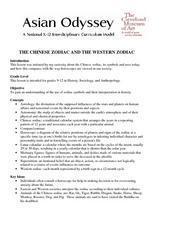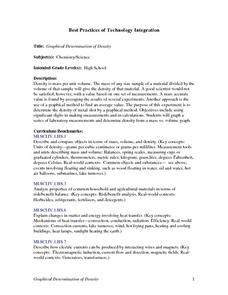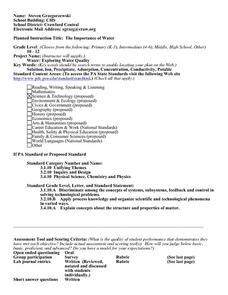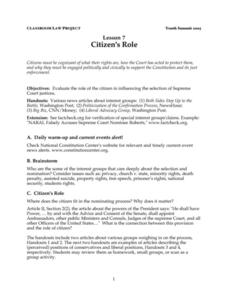Curated OER
What is the Thermal Depolymerization Process?
Young scholars examine the differences between Boyle's Law and Charles' Law. They discuss the concept of thermal depolymerization. They answer discussion questions to end the lesson.
Curated OER
The Chinese Zodiac
Students create their own personalized Zodiac page on a word processing
document after researching and discussing the origins of Zodiak signs. This lesson does include resource links and may be controversial.
Curated OER
The Chinese Zodiac And The Western Zodiac
Students create individual horoscopes that contrast and compare Western and
Chinese views of their futures using poster boards and magic markers. In-class discussion is used to evaluate the use of the Zodiac in different cultures.
Curated OER
Graphical Determination of Density
Students determine the density of metal shot by a graphical method using significant digits in making measurements and calculations. Students graph a seris of laboratory measurements and determine density from a mass verses volume graph.
Curated OER
Indi/Visual
Eighth graders take photographs for a photo essay contest. Using primary source documents, they review various types of artwork and discuss how some of the images have become commonplace. They use the internet to view examples of...
Curated OER
Ideal Gas Law
Young scholars explain and use ideal gas law and use the law to solve problems. They use conversion factors to convert mass to mol. Also students use stoichiometry skills previously learned.
Curated OER
Making New Electricity
Students investigate the concepts of energy conversion and conservation. They research the history of energy conversions into electrical energy. They design experiments in order to replicate a conversion of energy into electricity.
Curated OER
Stellar Spectral Fingerprints
Young scholars listen as the teacher introduces Newton's early discovery of the diffraction of light. They use multiple sources of light (fluorescent, incandescent, sunlight, etc) to bend the light. They first use a prism then a...
Curated OER
Molar Ratio
Students conduct an experiment in which they react sodium bicarbonate with hydrochloric acid to determine the molar ration between the two reactants. Students must write correct formula and a balanced chemical equation and explain how...
Curated OER
Cloud Sort
First graders gain a better understanding of types of clouds. They recreate clouds using Kidspiration. The types of clouds they study about are cirrus, cumulus, and stratus clouds.
Curated OER
How does the Amount of Light Affect a Photogram?
Students observe pictures of themselves using film and discuss how they think the image is processed to produce a photograph. They are introduced to photogram paper comparing it to photograph paper but understanding that no film is...
Curated OER
Determination of Phosphates
Young scholars engage in a laboratory instructional activity in order to increase understanding of the impact of phosphates at the chemical and ecological levels. The lab exercise is completed with the goal of getting them to predict the...
Curated OER
The Importance of Water
Young scholars explore the importance of water. They discuss why water is important and students design an experiment that evaluates the water quality and methods of improving water quality. Young scholars perform testing and report...
Curated OER
Citizen's Role
Students discuss the role of citizens in the United States. In groups, they evaluate how the role of citizens is important when selecting Supreme Court Justices. They read articles about internest groups and complete worksheets to end...
Curated OER
Air: You Can't See It, But It's There!
First graders investigate that air occupies space by performing experiments that show this principle. Students are provided with a lunch bag. Students open the lunch bag and look inside. Students determine if there is anything in their...
Curated OER
Browsing Music
Students survey how the Internet has changed the way we listen to music. Research the powerful new music browser called SIMAC. Test the music field and see if this new concept helps to put in words on a sound track what couldn't be...
Curated OER
"If the facts don't fit the theory, change the facts"
Learners read a paper describing Einstein's 1905 papers. They answer five teacher-provided questions in small groups to consider the importance of his findings. Students describe in personal writings what effect they think these findings...
Curated OER
The Right Tool for the Job: Diagnosis Spectrum
Pupils watch a section of a medical TV show and individually make a written recommendation of appropriate imaging techniques to be used and explain why they chose these techniques. They participate in a discussion revealing their...
Curated OER
Thinking inside the Box: Dangers of Tanning Beds
Students research their assigned position pro- or con- for the statement "The use of tanning beds by teens should be regulated" and write a short position paper. They participate in a debate concerning the statement. Students write a one...
Curated OER
Floaters and Sinkers
Fifth graders define density as the amount of mass per volume a material contains, compare the densities of several types of materials, especially those that sink in water compared to those that float. They use two different methods to...
Curated OER
Angles and Parallel Lines
Sixth graders draw parallel and intersecting lines to observe and examine the characteristics of alternate interior angles, vertical angles, corresponding angles, and supplementary angles. Through observation, they discover the...
Curated OER
Where's the Evidence?
Eighth graders observe evidence of chemical reactions. In this chemical reactions instructional activity students study chemical processes and complete a lab activity.
Curated OER
Powered Up About Electricity!
Students study the process of turning coal into electricity. In this electricity lesson, students are guided by their teacher through the steps required to turn coal into electricity. Students complete a worksheet answering questions...
Curated OER
Converting Metric Units and Prefixes
Students investigate the length of various objects. In this measurement instructional activity, students convert one metric unit to another. They explain the importance of a uniform system of measurement.
Other popular searches
- Properties of Matter
- Physical Properties of Matter
- Properties of Matter Song
- Useful Properties of Matter
- Science Properties of Matter
- Properties of Matter Booklet
- Properties of Matter Lecture
- Compare Properties of Matter
- Chemical Properties of Matter
- Social Properties of Matter
- Properties of Matter Test
- Intensive Properties Matter























